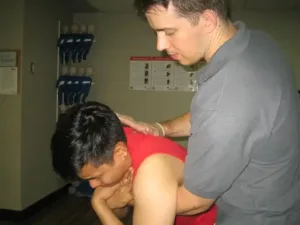If you are looking for first aid, cardiopulmonary resuscitation (CPR), and automated external defibrillation (AED) training in Windsor at low prices with great instructors, you can register with Windsor First Aid. This workplace approved training provider has been offering St Mark James first aid and CPR courses in Ontario since 2006. It is an experienced training service provider that offers a variety of classes with top-notch instructors who cater to your learning needs. Windsor First Aid offers a variety of classes such as CPR training courses, stand-alone classes on safety hazards, private classes, and refresher courses.
More information can be found on the Windsor First Aid homepage. You can visit the website by clicking this link. There are different ways to sign up for a class: the form below, telephone call, e-mail, or in person during business hours.
Most Competitive Prices for First Aid Training
Windsor First Aid offers a wide range of courses and renewals at the most competitive rates. Tuition, taxes, manuals, certificates, and registration fees are all included in the training fees. There are no additional fees incurred during training since everything is paid during enrolment. If ever a student drops out, full refunds are given as long as the staff was informed at least 3 days beforehand.
Huge Variety of CPR, First Aid, and AED Courses
Another advantage that makes Windsor First Aid the leader in first aid courses within Ontario is because of the numerous full courses and renewal classes it offers. Below is a short list of readily available training courses through Windsor First Aid.
-
First Aid Training in Windsor Standard first aid (with CPR)
- Emergency first aid (with CPR)
- CPR level A (adult CPR and AED)
- CPR level C (adult and pediatric CPR and AED)
- CPR level HCP (adult and pediatric CPR and AED for health care providers)
All the first aid and CPR training courses include training in AED. AEDs are used in hand-in-hand with CPR, as part of the latest Basic Life Support (BLS) guidelines made by the American Heart Association. AEDs are machines that detect heart rhythms and provide shock to victims who suffer from cardiac arrest. Training using manually-operated and automatic AEDs will be included in CPR training classes.
Stand-alone classes are also available for trainees who do not want to go through the entire course, such as basic first aid and CPR and AED only classes. Other stand-alone classes are focused on safety and necessary actions undertaken during emergency situations. The following video is an instructional video on proper hand washing, that is included in the food safety stand-alone class.
Workplace Approved Certification
All students who pass any of these training courses are awarded a certificate by this workplace approved provider for first aid, CPR, and AED, valid for 3 years. Recertification courses may be taken by trainees who wish to keep their certificates valid. Windsor First Aid does not renew expired certification. Refresher courses are offered at least twice a week, with notably lighter course loud than the regular training classes. Certificates are valid all throughout Canada.
Private classes
Private classes are offered to groups or companies who request a separate training class, usually for skill development of employees or as a team-building activity. Trainees who also experience scheduling troubles may opt to enrol in a private class as well.
Location
Training centers are located throughout Ontario, and are easily-accessible by public and private transport. The centers are near restaurants and shops for the trainee’s convenience. High-end technology for CPR and first aid classes are found in all the training centers, used during the hands-on part of the training course.
Below is a sample lesson to give you a head start on your CPR training. The video will show you how to take an infant’s pulse during CPR. Enroll at Windsor First Aid today!
CPR Techniques – Pulse Checks
Many participants who enrol in workplace approved first aid and CPR training programs have the same question, “Why don’t we do pulse checks?”. In 2005, the CPR guidelines removed pulse checks for rescuers during the primary assessment. The latest research showed that many rescuers and health care providers struggled to find the pulse accurately in the short time frame prior to providing CPR. This caused a delay in starting needed chest compressions. Studies have shown that early and adequate chest compressions increase a person’s chance for survival. With the latest BLS guidelines, rescuers are taught to assume cardiac arrest is present if a victim is not breathing and unresponsive. To learn more about the latest techniques enrol in first aid training in Hamilton, Ontario.

